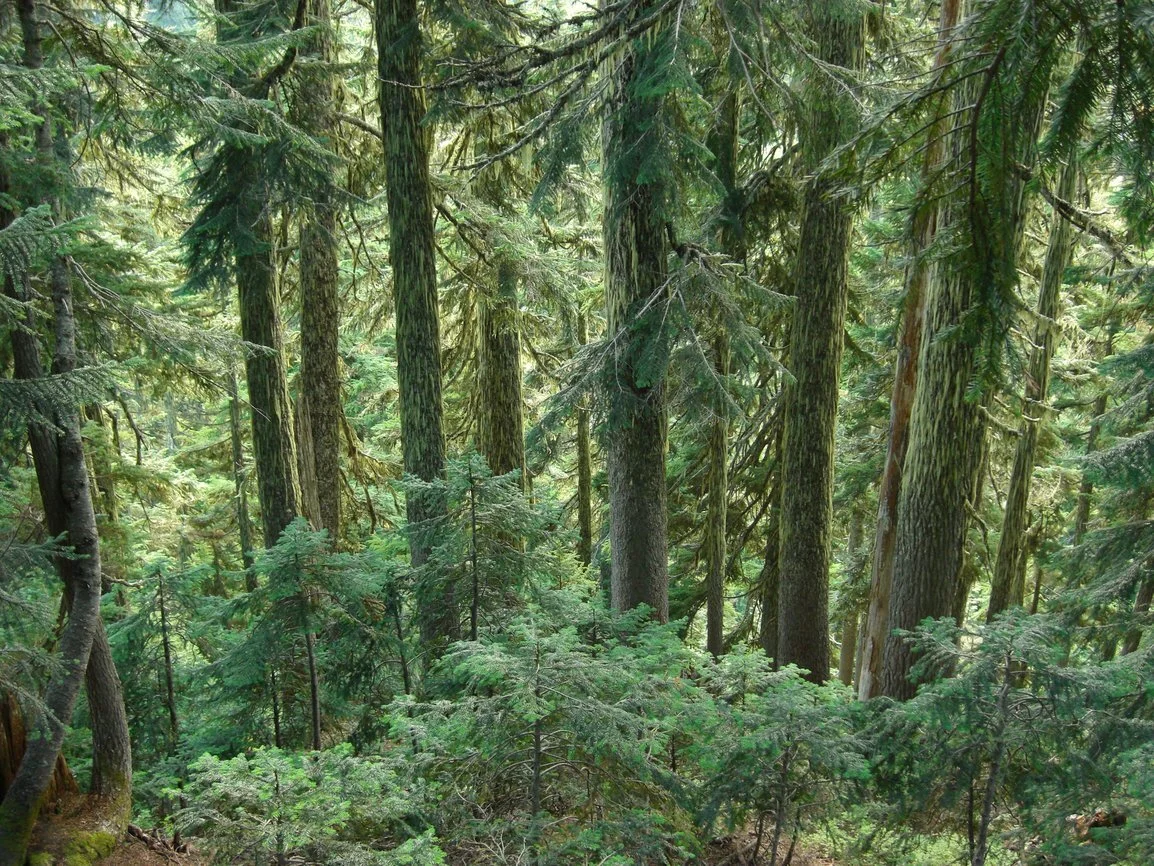Hemlocks
The end of another sleepless night and I’m out of the house armed with a twelve-gauge heading up through the hemlock woods to the garden. While I’ve been busy with an early harvest and devising ways to keep critters out of the fall seedlings, I’ve ignored the larger life around me, including the hemlocks, companions most of my life. This dank morning the forest seems alien to me. That line from the old song, “I talk to the trees but they don’t listen to me,” suggests a ridiculous egotism I hope I don’t represent here. I hear the trees talking in low whispering tones, but my talking to them is, well, inconsequential.
The northern forest has always been considered a holy place. German theologian Rudolph Otto maps out the aesthetics of it in his book The Idea of the Holy. “The semi-darkness that glimmers in vaulted halls or beneath the branches of a lofty forest glade, strangely quickened and stirred by the mysterious play of half-lights, has always spoken eloquently to the soul.” Otto says that to have a mystical effect the forest darkness must contrast with a flickering or dying light. I wonder if what we dub “mystical” – the mysterium tremendum experienced in old-growth forests – isn’t just the awe of contemplating primordial survivors. The hemlocks around my garden aren’t so much relics of that past as ghosts of it. And if ghosts are memories floating loose from bodies that once owned them, then these trees carry memories of long gone snow storms and blistering droughts beyond written history…
I’m through the apple and cherry orchard, into the plummy dawn light. No critter – no woodchuck, coon or porcupine – yet, just the ooze of deep woods silence. Part of me feels linked to this forest while another is disconnected. I want the hemlocks to be transcendent but that’s a human wish. They wish the darkness were darker, that their broken branches would mend and that their lives’ possum-slow curve would be even slower. No doubt, they communicate with each other, but each thought takes months, years, to be expressed. They tell each other stories beyond words, with no end. There’s no irony, no humor in their stories, but there is agreement that time is memory, that without memory they’re no more than bark-encased impulses of tree sap…
Our hemlock grove provokes in me a mystical wonder – how couldn’t it? – based on my intimacy with the woods’ moods and an awareness of its teeming particulars. Each day, these hemlock groves say something different. After a blizzard their boughs shake off their snowy burden and shiver with delight; following a heavy rain, they rise like intertwined phantoms in the mist. The mood of the woods sparks an awe in me distinct from the fear that Otto says comes from the forest’s “unapproachability.” Fear comes from ignorance. Otto’s Calvinism, the kind our Puritans brought to the New World, mistakes ignorance for humility...
Fear of the void has dogged the Puritans, Calvinists, and their descendants ... ever since. But there’s not much of the void – no empty horizon, no duney wastes – in the hemlocks, numinous and mystical though they are. They give us more opportunities for delight than occasions for dread… And it must be a sin, has to be sin, not to take delight in them…
Today a warm late-July rain streams down the hemlocks… If you drink the rainwater from the pools around these hemlocks your insides will pucker and turn Ceylon tea-brown. No theological text discusses the soul’s in-drawing caused by a micro-quivering of one’s nostrils at the styptic aroma of evergreen needles and bark. After rain, when the hemlocks’ pheromones are released into the air, the soul congeals to the size of a blueberry… The odor is woody and vinegary.
After this, Jesus knowing all things were accomplished, that the scripture might be fulfilled, saith, I thirst. Now there was set a vessel full of vinegar: and they filled a sponge with vinegar, and put upon it hyssop, and put it to his mouth. When Jesus therefore had received the vinegar, he said, It is finished: and he bowed his head, and gave up the ghost.
It’s not just fortuitous that the vinegar-soaked sponge forced into Jesus’ mouth has hyssop placed upon it. Hyssop, a word of Greek origin, was named from azob, an evergreen herb, because it was used to clean holy places. It is alluded to in the scriptures: “Purge me with hyssops, and I shall be clean.”
…There’s an astringent finality to Jesus’ giving up just as there is a diminishment of one’s ego in the midst of hemlocks whose sharp scent forces one conversely – and involuntarily – to be drawn out of oneself. Wine vinegar and hyssop were the last things Jesus tasted on earth…
First and last things merge in hemlock groves. Often their deep melancholy makes me feel like the last person on earth. Sometimes after a rainstorm, I’m revived. The hemlocks’ shadows and their acidic scent, not unlike that of incense, and their primal silences stimulate mindfulness. Hemlock groves are acoustical dead zones. Ferns and sphagnum moss carpeting the dampish floor baffle and dampen sounds. Were the hemlocks to have a grammar, it would be punctually declarative, but if they spoke it wouldn’t be in Latin. Their language is the raw demotic of country bumpkins… Their dour Franciscan habits proclaim a message of compassion to all living creatures. When I walk in the redwoods, I feel like I’ve gone to heaven. But the hemlocks are purgatorial. Some trees raise me up and make me shout “Lordy,” but a hemlock grove elicits no more than a murmur.
Tony Whedon is an award-winning poet and essayist from Vermont. Read more.
Tony Whedon’s essay “Hemlocks” is excerpted from Drunk in the Woods, published by Green Writers Press, and is reprinted here by permission of the author.


